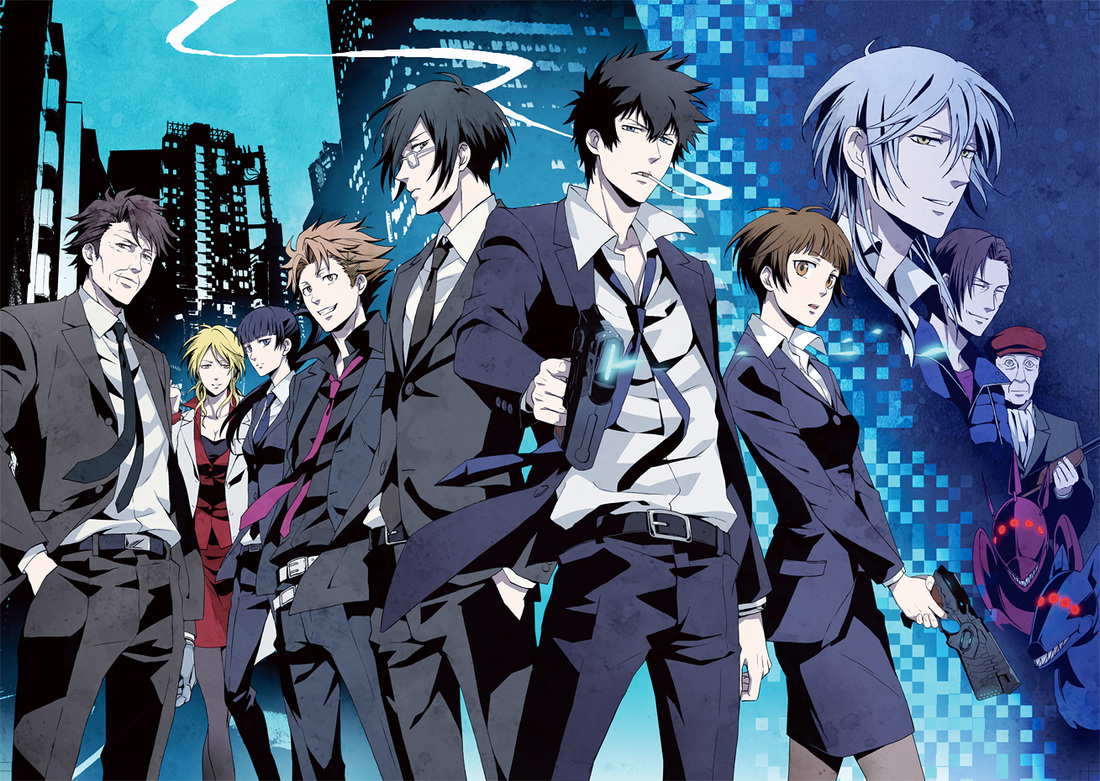Genres: Cyberpunk, Police procedural
Creators: Urobuchi Gen, Shiotani Naoyoshi, Motohiro Katsuyuki
Studio: Production I.G.
Length: 22 episodes (season 1), 11 episodes (season 2)
Years: 2012-2014
I remember I was once talking to some friends of mine about our respective tastes and favorite genres. I had been watching and reading a lot of science-fiction lately, so I mentioned I enjoyed series like Ghost in the Shell, Minority Report, and Blade Runner. And in response to this, one of my friends asked if I only liked “dark, depressing, monochromatic cyberpunk”. Well, I don’t exclusively watch series and movies which fit this description, I certainly do enjoy a good cyberpunk flick, and one of the best anime cyberpunk series is Psycho-Pass.
It’s the year 2112. Deciding to return to the isolationist policies of the past, Japan has closed itself off from the rest of the turbulent world. Wishing to establish a perfect society, much of the governance of the country has been handed off to a massive computer network called the Sibyl System. The System uses advanced technology to monitor the mental and emotional state of each citizen, which it then quantifies into a number called a “Psycho-Pass”. A low number represents happy, productive, stable member of society. A high number represents a citizen who is unhappy, rebellious, or otherwise emotionally unstable. If your number gets too high, then you will be marked for (non-voluntary) therapy or, in extreme cases, execution.
The story follows a young woman named Tsunemori Akane who’s fresh out of the national police academy and is assigned to the Public Safety Bureau as an Inspector. But most of the department’s heavy lifting is done by men and women called “Enforcers”, latent criminals whose Psycho-Pass has exceeded normal limitations but are allowed to hunt down other criminals on behalf of the state. This largely reduces the Inspectors’ job to that of a glorified baby-sitter, a situation that Akane is distinctly dissatisfied with. She begins to revive the ancient and mostly-forgotten practices of investigative police work. But this in turn puts her at risk, because the more she understands criminals and their motivations the higher her own Psycho-Pass number will go.
If Ghost in the Shell is the anime version of Blade Runner, and Stand Alone Complex is comparable to NCIS, than Psycho-Pass is essentially the anime version of Minority Report. Although the Sibyl System doesn’t actually predict crimes before they happen, Psycho-Pass deals with many of the same philosophical issues raised in the film. The Sibyl System, by reading an individual’s emotional state, merely indicates the predilection to commit crime rather than crime itself. This raises a slew of problems and philosophical conundrums, such as in the first episode when an innocent civilian who is the victim of a violent crime is so traumatized by the event that her Psycho-Pass exceeds acceptable levels and is marked for death by the System. In a society where everyone is constantly monitored for criminal tendencies, the police have been neglected and have decayed to little more than the Sibyl System’s executioners, which is especially ironic considering that the weapons carried by both Enforcers and Inspectors are tied to the System and will only fire if it gives proper authorization. And of course, there’s the problem of what happens if a person is able to commit crimes without their Psycho-Pass being elevated…
Psycho-Pass was created by Production I.G., the same studio responsible for both the film and television adaptions of Ghost in the Shell. Because of that, as well as the moderately similar subject matter and equivalent tones, makes the two series feel like cyber punk cousins of each other. The show is also strongly influenced by classic cyber punk films like the aforementioned Blade Runner and Minority Report, so if you’re a fan of the genre or science fiction in general you can’t go wrong with this series. In addition, the series was created by Urobuchi Gen, the same writer behind both Fate/Zero and Puella Magi Madoka Magica, although it’s not quite as depressing or as violent as either of those series.
In addition to the show’s two seasons, there’s also a recently-released movie which wraps up some plot points from the second season, but I have not yet had a chance to see it. But from what I’ve heard, it’s really awesome. So if you’re like me and love dark, depressing, monochromatic cyber punk series and movies, or if you want to give one a shot, then you can’t go wrong with Psycho-Pass.
This article is part of an ongoing series; recent installments have covered Durarara!!
You can watch Psycho-Pass (season 1) here.

 RSS Feed
RSS Feed
